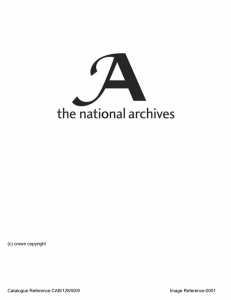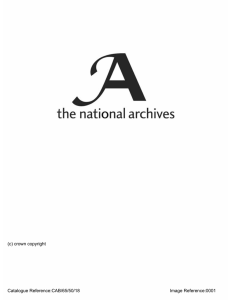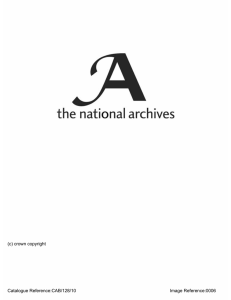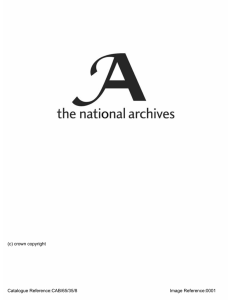(c) crown copyright Catalogue Reference:CAB/128/12 Image Reference:0028
advertisement
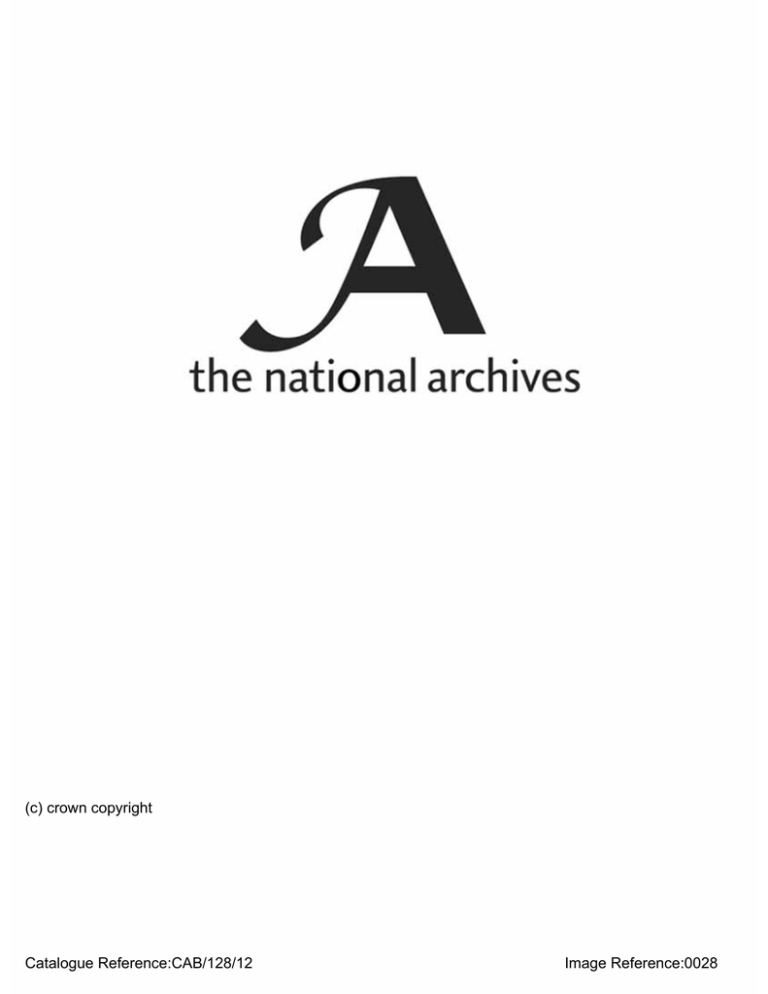
(c) crown copyright Catalogue Reference:CAB/128/12 Image Reference:0028 IS DOCUMENT IS THE PROPERTY OP HIS BRITANNIC MA3ESTY'S Printed for the Cabinet. GOYERNMENT April 1948 SECRET Copy No. CM. (48) 28th Conclusions C A B I N E T 28 (48) CONCLUSIONS of a Meeting of the Cabinet held at 1 0 Downing Street, S.W. 1, on Thursday, 15th April, 1948, at 1 0 a.m. Present: The R i g h t H o n . C. R . ATTLEE, M P., Prime Minister (in the Chair). The Right Hon. HERBERT MORRISON, \ The Right Hon. ERNEST BEVIN, M.P., M.P., Lord President of the Council. Secretary of State for Foreign Affairs. The Right Hon. S i r STAFFORD CRIPPS, The Right Hon. A. V . ALEXANDER, M.P., Minister of Defence. K.C., M.P., Chancellor of the Exchequer. The Right Hon. VISCOUNT ADDISON. The Right Hon. VISCOUNT JOWITT, Lord Chancellor. Lord Privy Seal. The Right Hon. J . CHUTER E D E , M.P., The R i g h t Hon. A. WOODBURN, M.P., Secretary of State for the Home Secretary of State for Scotland. Department. The Right Hon. ANEURIN BEVAN, M.P., The R i g h t Hon. G . A. ISAACS, M.P., Minister of Health. Minister of Labour and National Service. The Right Hon. GEORGE TOMLINSON, The R i g h t Hon. T. WILLIAMS, M.P., M.P., Minister of Education (Items of Agriculture and Minister 1-2). Fisheries. The Right Hon. J H . WILSON, M.P., President of the Board of Trade. The following were also present: The Right Hon. ALFRED BARNES, M.Jf., The Right Jtlon. JOHN STRACHEY, M.P., ^j-iiiiOLti U l l u u u O&ltit u/­ Minister of Transport (Items 3 - 4 ) . The R i g h t Hon. G . R. STRAUSS, M.P., The Right Hon. WILLIAM WHITELEY, M.P., Parliamentary Secretary, Minister of Supply (Items 3 - 4 ) . Treasury (Items 1 - 2 and 5 - 6 ) . Secretariat: Sir NORMAN BROOK. M r . W . S. MURRIE. M r . S. E . V . LUKE 85289-1 C A B I N E T 28 (48) CONTENTS Minute No. Parliament 1 Page 193 Subject Business in the House of Commons. 2 193 Criminal Justice Bill Capital Punishment. 3 Economic Affairs .... .... .... .... 194 .... .... .... .... 195 Man-Power. Production. External Trade. Balance of Payments. Prices and Finance. 4­ Wages Policy .... .... .... Claims for wages increases by employees of local authorities and socialised industries. 5 Parliament 196 Amendment of the Parliament Act. 6 Appointments to Public Boards .... 197 Parliament. Business in the House of Commons. Criminal Justice BUI. 1. The Cabinet were informed of the business to be taken in the House of Commons in the following week. As regards subsequent weeks the Prime Minister said that on 26th April he would move an Address of Congratulation to Their Majesties on the occasion of their Silver Wedding. The House of Commons were anxious that a further debate on Foreign Affairs should be held in the near future. The Foreign Secretary said that he would be ready to suggest a date for this after his return from his forthcoming visit to Paris. 2. On the Report Stage of the Criminal Justice Bill on 14th A p r i l the House of Commons, against the advice of the Government, had carried by a majority of 245 votes to 222 a new Capital clause providing t h a t for an experimental period of five years Punishment. imprisonment for life should be substituted for the death sentence (Previous as the penalty for murder. Reference: Ministers agreed that the Government must acquiesce in this C.M.(48)27th decision, recorded by a free vote of the House of Commons, and Conclusions, must in due course recommend the House of Lords to accept the new Minute 2.) clause. The Home Secretary said that he had been considering how he should discharge his responsibility for advising the Crown on the exercise of the prerogative of mercy in capital cases during the period before the new clause became law. He believed that, in the face of this vote by the House of Commons, it would be wrong for him to allow the death sentence to be carried out in any case which came u p for decision before the proceedings on the Criminal Justice Bill had been completed in the present Session. A more difficult situation would arise if the House of Lords rejected the new clause, and the passing of the Bill was delayed until the following session by reason of a disagreement between the two Houses on this point. I n that event it might become necessary to revert for a time to the practice followed hitherto in deciding whether or not to recom­ mend clemency in capital cases. For the time being, however, he intended to assume that the new clause would be enacted during the present Session; and on that assumption he proposed that, mean­ while, no death sentence for murder should be carried into effect. H e proposed in every case to recommend to H i s Majesty that the death sentence should be respited and commuted to one of penal servitude for life. H e hoped that the Secretary of State for Scotland would follow the same policy. I n discussion it was suggested that it might be preferable to continue to act under the existing law until the Bill altering it had finally become an A c t : it would be specially unfortunate if a second change of practice became necessary because the passage of the Criminal Justice Bill had to be deferred until the following Session. Against this, however, it was pointed out that the prero­ gative of mercy was not derived from statute law, and there was no question of the Home Secretary's failing to comply with the existing law if he followed the course which he proposed. In advising the Crown on the exercise of the prerogative of mercy in Capital Cases, i t was the duty of the Secretary of State to take into account, among other considerations, the current state of public opinion on the general question of capital punishment; and, in view of the vote recorded by the House of Commons on the previous day, i t was clearly open to him to proceed on the basis that it would be repugnant to public opinion that any sentence of death for murder should be carried out while Parliament was still considering the Criminal Justice Bill. The question was also raised in the Cabinefs discussion whether the new clause, which was at present limited to murder, should be extended so as to apply equally to sentences of death passed on conviction of treason, arson in royal dockyards or piracy. I t was pointed out that for the two latter offences the death penalty had not in practice been imposed for many years past. I t was equally unlikely that any person would be sentencecr to death for 35289-1 B 2 treason in time of peace. I n these circumstances it was unnecessary to amend the clause which the House of Commons had passed, and it was inexpedient that the Government should attempt to do so. The C a b i n e t ­ (1) Endorsed the proposal that during the remaining pro­ ceedings on the Criminal Justice Bill in the present Session of Parliament the Home Secretary and the Secre­ tary of State for Scotland should in every case recom­ mend that any death sentence for murder should be respited and commuted to one of penal servitude for life. I n further discussion Ministers agreed that, in the light of this expression of opinion by the House of Commons, the Cabinet should review at an early date the existing powers of courts to impose the death penalty in the British Zone of Germany, in British Colonial territories, and in the Armed Forces of the Crown. The C a b i n e t ­ (2) Invited the Foreign Secretary to submit a memorandum on the question whether the death penalty should continue to be imposed as a penalty either for war crimes or by Control Commission courts for current criminal offences in Germany. (3) Invited the Secretary of State for the Colonies to submit a memorandum on the continuance of capital punishment as a penalty for murder in British Colonial territories. (4) Invited the Minister of Defence to report to the Cabinet, after consultation with the Service Ministers, what con­ sequential alterations should be made in the powers of courts-martial if the civil courts in this country were deprived of the power to impose the death penalty for murder. Economic Affairs. (Previous Eef erenee: C.M.(48)23rd Conclusions, Minute 4.) 3. The Cabinet had before them a note by the Chancellor of the Exchequer ( C P . (48) 105) covering the ninth of his periodical reports on the economic situation. The following points were raised in discussion :— The total numbers in civil employment had risen in February by 27,000, not 29,000 as stated in paragraph 1 of C P . (48) 105. Man-Power. Production. The production of coal in the first fourteen weeks of 1948 had exceeded the,target for the period, and the figures of employ­ ment in the industry had also continued to rise steadily. Steel pro­ duction had reached a level which should enable the year's target of 14 million tons to be substantially exceeded, and it would be necessary to review the allocations of coal, &c., to the industry to ensure that output could be sustained a t this higher rate. The rate of increase in the labour force of the. textile industries was disap­ pointingly slow, and greater reliance must now be placed on increased efficiency as a means of securing the larger output required. The motor industry was making satisfactory progress towards its export target of 75 per cent, of total production, but the increase in the total value oi car exports was noticeably less than the increase in the number of vehicles exported. The number of new permanent houses completed was larger than had been expected : it had risen to 15,725 in February and to about 17,000 in March. As the number of new contracts was strictly controlled, the housing programme was being brought into balance. I n some areas local authorities were being prevented from placing new contracts, though there were ample stocks of bricks available and local unemployment among bricklayers; and, as the shortage of houses was still acute, this position was causing concern. Could there not be some latitude to relax the existing restrictions in such areas ? I t was pointed out that. the Cabinet had agreed on 23rd February to the allocation of an additional 60,000 standards of timber for housing during 1948 to enable a further 30,000 permanent bouses to be started in that year. Though stocks of timber were now high, a further allocation for this purpose might endanger supplies against future requirements. The Chancellor of the Exchequer undertook, however, to have the point considered. I n industrial building steel was the limiting factor, but an additional allocation had recently been made which should enable the most urgent requirements to be met. The small reduction in exports in February was without signi­ ficance. The volume of exports in March was about 130 per cent, of 1938; and the three-monthly averages during the period from January 1947 had shown a steady increase. Attention was drawn to difficulties in expanding our coal exports. No restrictions were now placed on the export of coal, but markets were hard to find; this was largely due to the poor quality of the coal offered and the high prices quoted. Ministers were concerned lest the goodwill of European importers should be forfeited, as after 1918, because the industry took advantage of a temporary shortage to sell poor quality coal a t excessive prices. I t was possible t h a t the United States would shortly cease to supply coal to Europe on a large scale, and it was important that we should be in a position to take full advantage of any such change in the situation. There was a risk that the National Coal Board might concentrate on the problems of production to the detriment of efficient distribution and marketing. The Minister of Fuel and Power was discussing these questions w i t h the Board; and atten­ tion would be given to the need for creating, within the Board, an effective functional organisation with special responsibility for marketing and export. The drain of gold to Belgium had continued, but it was hoped as a result of the recent agreement that a balance would shortly be achieved and that a p a r t of our losses would be recovered over the next eighteen months. The terms of trade had continued to move against us during March. While there had been some further rise in the prices of our exports, the increase in import prices was even greater. To some extent this was due to the fact t h a t a number of our long­ term contracts had become due for renewal, and we could not hope to renew them on the very favourable terms which we had originally secured. Increasing difficulties were also being encountered in main­ taining or securing export markets; and the transfer from dollar to soft currency supplies often involved the payment of higher prices. The C a b i n e t ­ (1) Took note of C P . (48) 105 and of the points raised in dis­ cussion. (2) Invited the Minister of Fuel and Power to circulate a memorandum to the Production Committee on the pros­ pects of expanding coal exports. 4. A t their meeting on 19th February the Cabinet had invited the Minister of Labour to concert w i t h the other Ministers con­ cerned arrangements for obtaining from public bodies, such as local authorities and boards of socialised industries, immediate reports on all prospective or actual claims for higher remuneration made by their employees. The Cabinet now had before them a memorandum by the Minis­ ter of Labour ( C P . (48) 106) stating that, in his view, any formal request to the boards of socialised industries to supply information of this kind would be contrary to the general policy towards the boards followed by the Departments concerned with socialised industries, and t h a t for the same reason i t would be undesirable to make a direct approach to local authorities. Arrangements had, however, been made under which the Departments would imme­ diately pass on to the Ministry of Labour any information which they might obtain, though i t was admitted that the extent to which they were able to obtain such information varied. I n discussion Ministers pointed out that for the Government to ask the boards of socialised industries to supply this information was in no way inconsistent with their policy of not intervening in the day-to-day administration of the boards. The Government nad a special responsibility for ensuring that unjustifiable claims for higher wages or shorter hours made by public employees were not granted and it was impossible to accept a state of affairs in' which they would know less about claims by these employees than about claims by workers in private industry! I t had been agreed that the Minister of Labour should be responsible for questions of wages or conditions of work which arose m socialised industries, and there seemed to be no reason why he should not make a direct request to the boards of these industries and to local authorities to supply him with the information asked for by the Cabinet at their meeting on 19th February. I I I 1 ] 1 f I I I I The C a b i n e t Invited the Minister of Labour to reconsider, in the light of their discussion, the proposals made in C P . (48) 106. Parliament. Amendment .of the Parliament Act. (Previous Reference: C.M.(48)21st Conclusions, Minute 6.) 5. The Cabinet were informed that there was little prospect that the Conference of P a r t y Leaders would find a basis of agreement on the powers of a Second Chamber. The Conservative leaders were unwilling to accept the Government offer t h a t the period of delay under the Parliament Act procedure should be either twelve months from Second Reading in the Commons or nine months from Third Reading in the Commons, whichever is the longer period : the least that they would be willing to accept, in order to secure agreement over the whole field of the discussions, was a period of twelve months from Third Reading. The discussions had, however, shown that the real issue between the Parties was not, as might a t first appear, their differing views about the period of delay but a fundamental difference of view regarding the purposes for which the period of delay should be granted and used. The Conservative leaders believed that the Second Chamber should have this power of delay in order to ensure that, if serious disagreement developed between the two Houses, the will of the Commons should not prevail xmtil the public had become fully informed of the issues and time had been allowed for public opinion to crystallise. They clearly believed that the Second Chamber should have power in the last resort to force the Government of the day to seek a General Election. This was a claim which the Government could not accept; and it had become clear that there was no basis for a lasting agreement between the Parties on the powers of a Second Chamber. In these circumstances it seemed inevitable that the Conference of P a r t y Leaders should be broken off. A public explanation would have to be given of the reasons why the Conference had'failed to find a basis for agreement, and i t was thought expedient that this should also include a broad statement of the agreement which might/] have been reached on the future composition of the House' of Lords " if the difficulties about powers had been overcome. I t was contem­ plated that an agreed statement would be issued on the points of i agreement and disagreement; and that thereafter each of the Party f leaders would be free to explain and defend his attitude. Tlie Prime Minister indicated to the Cabinet the general lines which this agreed statement was likely to take. The Cabinet took note of the position. Appointments 6. The Cabinet were informed t h a t the Minister of Transport to Public had consulted the Lord President and the Minister of Health about Boards. a proposal to offer to the Clerk of a County Council a part-time appointment on the Hotels Executive. Both the Lord President and ((Previous Reference: the Minister of Health had thought that i t would be undesirable !c.M.(47)87th for a full-time officer of a local authority to serve as a part-time Conclusions, member of a public board of this k i n d ; but, as the question was one of general principle, it had been suggested that i t should be iMinute l . ) brought to the attention of the Cabinet. The C a b i n e t Endorsed the view t h a t full-time officers of a local authority should not hold part-time appointments on boards of socialised industries. Cabinet Office, S.W. 1, 15th April, 1948.

